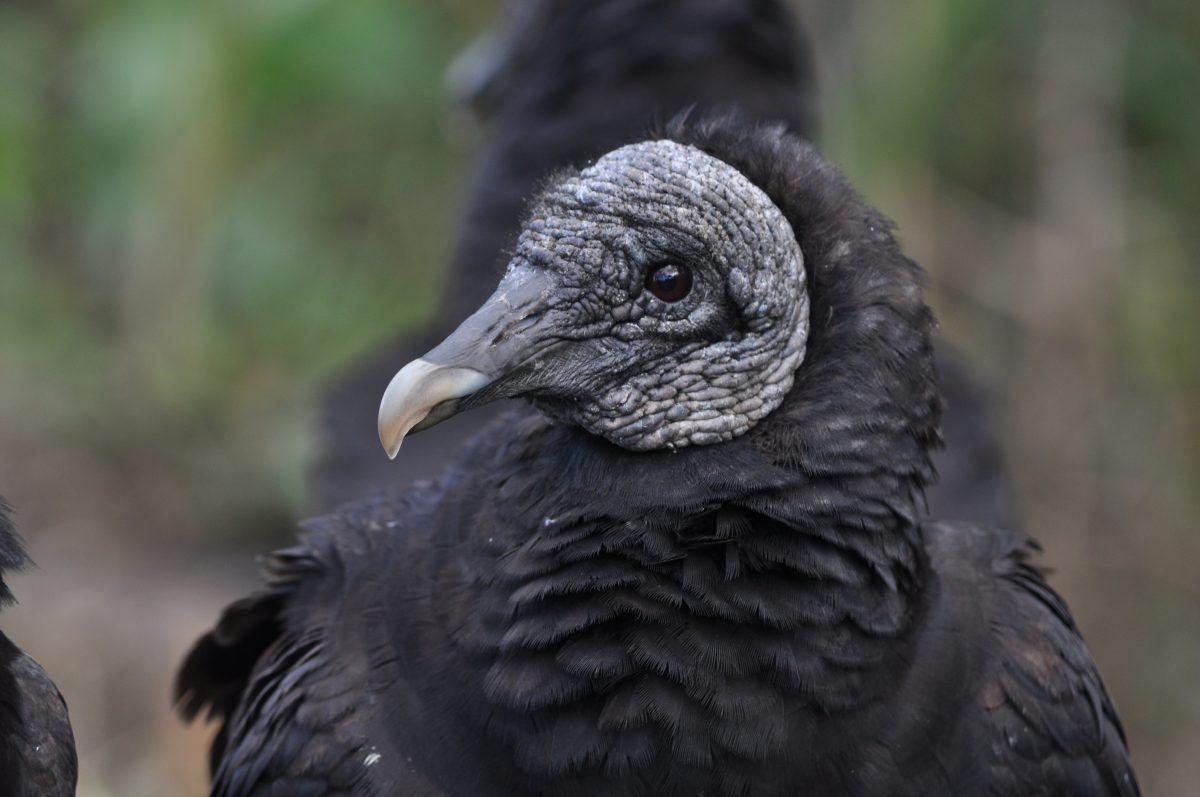When residents of Shelby, N.C. woke up last fall to something strange in their neighborhood, they didn’t call the Ghostbusters. They sought help from the N.C. State Cleveland County Cooperative Extension.
Hundreds of vultures descended upon a roughly two-block area of the small city in western North Carolina and terrified residents. The vultures were ready to make Shelby their new home for the colder months as part of their annual migration. Unable to shoot the federally protected turkey vultures and black vultures, which made up most of the vulture nuisance, residents looked for other options to try to ward off the large flying pests.
Kristen Duren, senior in the extension education program, stepped in to help rid the town of avian annoyances.
“My internship [with the cooperative extension department] started Jan. 11 and during the second week or so we got a phone call from a resident saying she had vultures hanging out in her backyard,” Duren said. “When she called, there were about 200 of them… and she was like, ‘I don’t know what else to do and I don’t think this is safe. How do we get them to leave this area?’”
Greg Traywick, the director of the West District Cleveland extension program, brought up Shelby’s vulture problem during a weekly progress meeting within the department. He asked if anyone had worked with vultures in the past.
“I said I volunteered when I was little, at the [Carolina] Raptor Center and I know a couple things but not a whole lot,” Duren said. “And he goes, ‘Good you’re in charge of things.’”
With Traywick’s help, Duren found ways to chase the unwelcome guests out of the city.
“[The vultures] were coming in during the day and [would] sit around for a couple hours chitchatting,” Duren said. “Then they would go off for a while only to come back and roost, which is when they come and sleep for the night.”
Duren said the turkey vultures and black vultures, hailing from northern areas such as New York and Canada, typically migrate to southern areas such as Florida. These vultures had cut their trip short upon finding Florida-like weather in Shelby.
“Animals, just like people, can be lazy, so they think, ‘Why do I want to fly an extra 500 miles to go down to Florida when it’s Florida weather here?’” Duren said.
Dealing with this problem was not an easy task, Duren said.
In addition to the unnerving appearance of the large black creatures, with wings spanning up to about seven feet, many residents expressed concerns of depreciating home values and recounted stories of vultures eating pet food and trash.
“All the feces and all the ‘yuck’ they bring increase the chance of spreading E. Coli in the area,” Duren said. “They are eating dead things so they are a hazard. Black vultures are attracted to bright shiny things and they’ll pull and pick at the shiny things. So some residents were left with leaks in their roofs.”
Although she said she was only 10 when she first started working at the Carolina Raptor Center, the experience equipped her with knowledge others didn’t have.
For example, although it may be some people’s first instinct to startle the birds, according to Duren, this may be one of the worst ideas for dealing with vultures.
“You’re not supposed to scare them because they vomit when they get scared,” Duren said. “That’s one of those things when you’re a kid that just gets glued in your head.”
According to Duren, one resident tried to take care of the vultures by himself — by using a flare gun.
“[He] waited until … it was starting to become dusk and all the vultures got into the area and then he fired that flare gun,” Duren said. “Instead of leaving, all the vultures proceeded to vomit on him. It’s just what [vultures] do as part of their biological mechanism. They think, ‘I’m scared. I’m going to vomit and maybe predators will eat that instead of me.’”
However, most humans don’t have a taste for vulture puke and find the experience rather disgusting. Furthermore, vulture vomit can damage the paint on cars and houses.
After a meeting with some of the residents affected by the vulture problem, Duren created an education brochure and, after conducting a needs assessment, came up with a few solutions.
Under her and the extension education program’s direction, residents chopped down dead trees that attracted the birds. She also developed another scare tactic—an effigy that sends the message to vultures that they were not welcome.
“[The effigy] is a vulture prop from a movie studio,” Duren said. “We put it head-down and wings out. It looks like a it’s a snared bird.”
Duren said she got the idea from U.S. Department of Agriculture Wildlife Biologists who have done research on vultures.
As part of the extension education program’s budget, Duren bought three vulture props and set up a loaner program allowing residents to rent out the effigies for up to two weeks before having to renew them.
“We had six residents check them out over the course of my internship and none of them really needed it for any longer than two weeks,” Duren said. “They all brought them back and were like, ‘that worked great. I put it up and never saw [the vultures] again.’”
There are no longer any vultures in Shelby according to Duren, but some of the vultures have moved, in smaller groups, to places around the Shelby area.
Although Duren remains on call for residents who have questions, she officially ended her relationship with the extension April 6.
Duren said she has mixed feelings about the experience, especially the idea of being known as “the vulture lady,” due to national radio and television coverage, but she said she is thankful for the experience.
“This was a very unique opportunity that I don’t think many of our seniors get a chance to have,” Duren said. “Being on national television and national radio a few times prepares you on a different level to be an adult and having to talk to people and educate them and tell them about what you’re doing in a professional manner … I like that I was able to do it. It was a good opportunity.”
Kristen Duren, a senior in extension education and intern at Cleveland County Cooperative Extension, works to control vulture populations in Shelby, N.C. Turkey Vultures and Black Vultures have both taken up residence and become a nuisance in the area.









